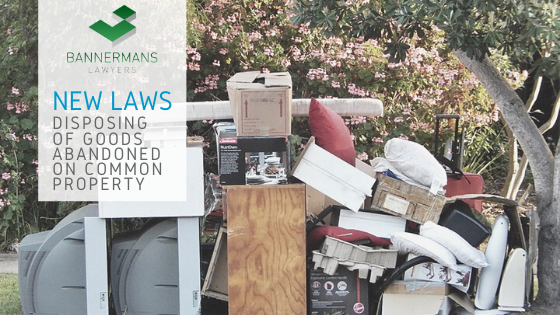INDUSTRY UPDATE
Disposing of Goods Abandoned on Common Property – New Laws
prepared by Bannermans Lawyers

As from 1 July 2020, new laws apply to disposal of goods abandoned on strata common property. New legislation came into force on that date, amending various acts and effectively transferring regulation of goods abandoned on strata common property from the Strata Schemes Management Act 2015 (“SSMA”) to the Uncollected Goods Act 1995 (“Act”).
Key points:
- The procedures previously available under the SSMA are no longer available.
- For the purposes of the Act, uncollected goods include goods which an owners corporation reasonably believes have been abandoned or left behind on common property of the strata scheme.
- A person disposing of goods will have no liability if they have done so in accordance with the Act or an order of the Tribunal.
- The Act divides goods into various categories and applies different rules for each:
- Perishable goods and rubbish may be disposed of without restriction.
- Low value uncollected goods are uncollected goods having a value of less than $1,000. The party in possession of such goods may dispose of them in “an appropriate manner” if they have given the owner written notice of their intention to do so and the owner has been given at least 14 days to collect the goods. They may move or store low value uncollected goods in an appropriate manner.
- Medium value uncollected goods are uncollected goods having a value of at least $1,000 but less than $20,000. A party in possession of medium value uncollected goods may dispose of them by public auction or private sale for a fair value, if the party in possession of the goods has given the owner written notice of their intention to do so and the owner has been given at least 28 days to collect the goods. They may move or store uncollected goods in an appropriate manner.
- High value uncollected goods are uncollected goods having a value of at least $20,000. A party in possession of high-value uncollected goods may only dispose of them in accordance with an order of the Tribunal, but may move or store high value uncollected goods in an appropriate manner.
- Personal documents are defined in the Act and include identity documents, records, photos and memorabilia. A party in possession of personal documents may dispose of them after giving written notice to the owner of their intention to do so and giving the owner at least 28 days to collect them. The party in possession of personal documents must dispose of them by secure destruction or returning them to the owner.
- Motor vehicles are subject to an additional requirement, being that the party disposing of them must obtain a personal property securities register certificate confirming that they are not encumbered and a police certificate confirming that they are not stolen.
- A party disposing of uncollected goods must keep appropriate records for at least 12 months in the case of low value uncollected goods and otherwise for six
- The Tribunal is given power to make an order for disposal of the goods and various ancillary orders.
For more information on the rules to move and dispose of uncollected goods, see the NSW Fair Trading Website


